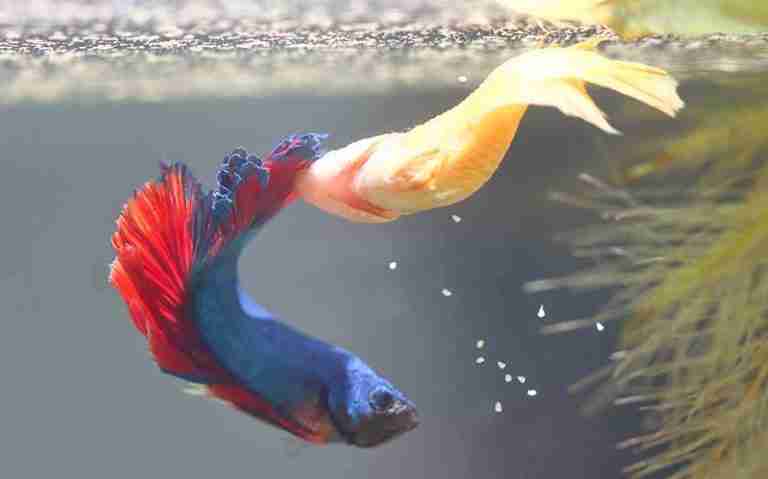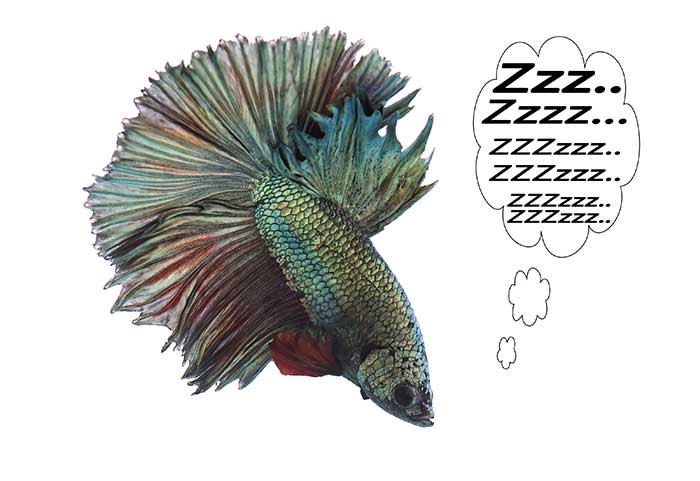Betta Fish Not Moving (11 Top Causes & Solutions)
Betta fish are one of the most popular pet fish in the world, each with their unique look and personality. Betta fish have so many unusual behaviors, that it’s sometimes difficult to know if they are sick or just acting differently. One such behavior is a betta fish not moving around, and instead sitting motionless in the tank.
The most common reason why your betta may not be moving very much is that it’s taking a nap, or just having a rest. Often this behavior makes it difficult to tell if your betta fish is sick, dying, or already dead, and as a responsible pet owner, you need to investigate.
If your betta fish is usually quite active, it can be concerning to see them floating in the aquarium, perfectly still for extended periods.
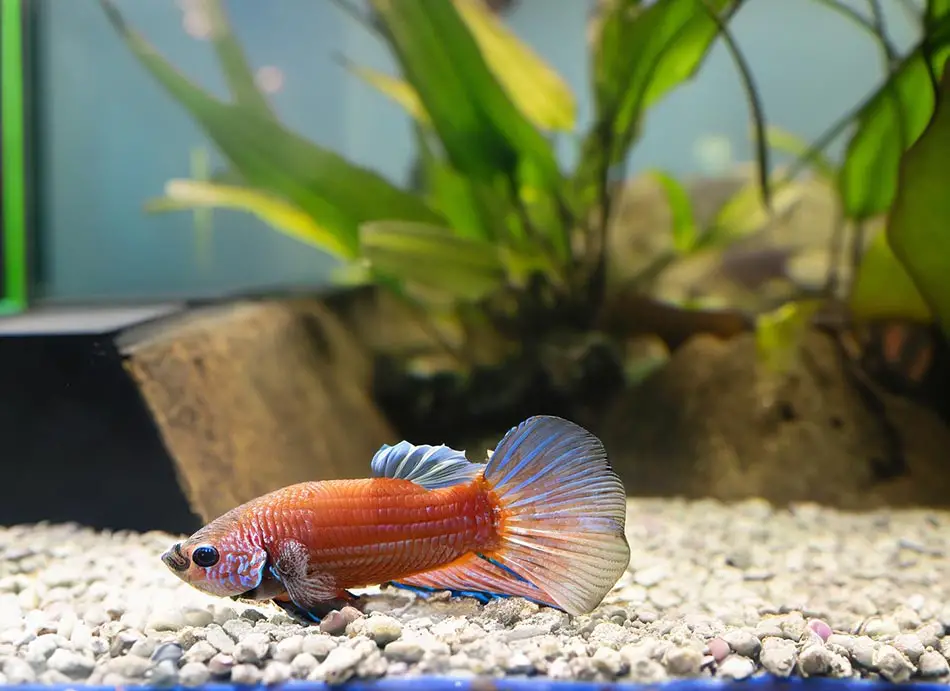
If you are concerned that your betta has stopped moving, this article explains the 11 most common reasons and what steps you can take to ensure its well-being or even save its life!
Why Is My Betta Fish Not Moving?
If you’re wondering why your Betta fish is inactive and motionless, there could be several reasons.
- Your Betta is sleeping or resting.
- Your Betta could be stressed.
- Your bettas diet may not be healthy enough.
- Old age can cause a betta fish to be less active.
- Poor tank maintenance which causes a rapid change in water parameters.
- Your betta fish is lazy!
- Unsuitable tankmates causing stress.
- Your betta’s tank is too small for them.
- You have a sick betta fish that needs attention.
- Swim bladder disease is affecting your betta’s buoyancy.
- Your betta may be close to death or has already died.
Many of the reasons why your betta fish may suddenly stop moving around its tank are easily fixed or can be ignored altogether, but never get complacent. Sudden changes in your betta’s behavior can be a sign of illness, which in most cases are treatable if caught early.
In the next sections, I look at each of the reasons above in a little more detail, which should help you more easily understand why your betta fish is not moving.
Your Betta Fish Is Sleeping
Betta fish get the majority of their sleep at night, and apart from the occasional nap during the day, betta fish are usually pretty active, exploring their tank and feeding.
If your betta fish is less active during the day, it’s possible they are tired because something is keeping them awake at night, which you should investigate.

If your betta is not moving, you can often tell they are asleep when:
- Your betta is staying still in one spot.
- Fins are moving to keep your betta in place.
- Gills are moving as they breathe.
- Your betta’s color may fade to make other fish think they are sick or dying, so they stay away.
- On waking, your betta’s color returns and they become more active.
Ensure your betta fish is getting enough sleep by providing a comfortable environment at night. Switch off the tank light at night and minimize any noise or sudden flashes of light that may startle your betta. Betta fish need 8-10 hours of sleep per day but remember, sometimes betta fish sleep more when they are unwell or getting old.
I use automated timers to switch off the tank lights at night, but dimming lights can also help regulate sleep patterns by emulating natural lighting conditions.
Your Betta Is Stressed
Stress is common in betta fish and can be a reason why they are not moving. Betta fish can become stressed for a number of reasons, such as poor water quality, illness, bullying from other fish, and an uncomfortable tank environment.
If your betta is stressed, there are often accompanying symptoms such as:
- Stress stripes.
- Clamped fins.
- Your betta stops eating.
- Your betta fish is hiding more often.
- Flaring fins and gills.
If your betta fish is not moving around as usual and showing other symptoms from the list above, they are likely stressed, and you need to identify the cause.
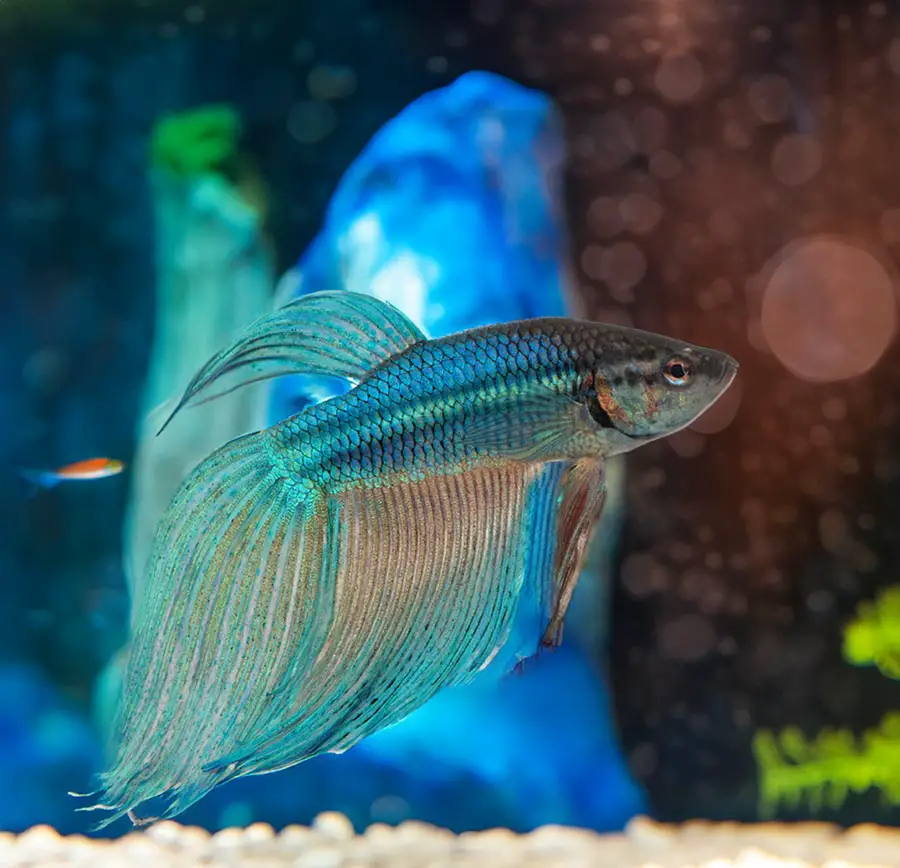
Betta fish can be temperamental creatures that get stressed over the tiniest of things, and once rectified, they will quickly return to their happy self!
Poor Diet
Betta fish need a high-quality, protein-rich diet twice a day to ensure good health. A poor diet can lead to various health issues, which may prevent your betta from moving around freely.
The most common health issues caused by a poor diet and overfeeding are:
- Constipation – A build-up of food in the digestive tract causing blockage and discomfort.
- Bloating – A build-up of gas from slowly digesting food.
- Swim bladder problems – Can be triggered by bloating, constipation, and other health issues. Swim bladder problems affect buoyancy, preventing your betta from moving or causing them to swim uncontrollably, upside down, or on their side.
Your Betta’s Age
Betta fish typically live for 3-5 years, although there are exceptions to the rule. Find out your betta’s age when you purchase them so that you know when they are getting old and likely to slow down, becoming less active as it ages.
You may notice that your aging betta fish starts to spend more time resting on the bottom of the tank with little movement, or they spend more time sitting in their favorite hiding spot.
To help you better understand what is considered normal behavior for an older betta fish, I have provided a table below outlining some common changes you may see as your fish ages.
| Betta Fish Age | Normal Day/Night Cycle | Expected Level Of Activity |
|---|---|---|
| Young (0-1 year) | Active during the day / Sleeps at night. | Rarely stops moving |
| Adult (2-3 years) | Short daytime naps / Sleeps at night. | Rests more frequently during the day |
| Senior (4+ years) | Sleeps more during the day / Sleeps at night. | Spend most of the time resing and conserving energy. |
It is important to note that changes due to aging are gradual and should not happen overnight. Sudden immobility or other concerning symptoms may be a sign of illness, and you should seek professional advice immediately.
Poor Water Quality
Maintaining proper water quality is crucial for the health and longevity of your betta. Poor water quality can lead to bacterial and fungal infections, often causing your fish to become lethargic and inactive.
Rapid changes to the water pH or an increase in ammonia can cause shock or illness, both causing your betta fish to become less active or to stop moving around altogether.
If you notice that your betta fish is not moving, check your betta tank’s water parameters. If necessary, perform an emergency tank cycle, however, a 50% water change is often enough to bring some immediate relief.
Incorrect Water Temperature
Bettas are tropical fish that thrive in warm water temperatures ranging from 75-80 degrees Fahrenheit. If the water is too cold, it will slow their metabolism, causing them to slow down and become less active. A higher water temperature will do the opposite, causing them to become overactive, darting around the tank full of energy.
Rapid changes in water temperature can be caused by exposure to strong sunlight, extreme draughts, or equipment malfunction.
You Have A Lazy Betta
Sometimes, even the most active betta fish can have lazy days where they prefer to lounge around their tank and watch the world go by, and it’s even more likely as they get older.
Individual betta fish have different personalities, and while some can be hyperactive, others can be lazy and inactive for long periods.
Unsuitable Tank Mates
Unsuitable tank mates can have a significant impact on the behavior and overall well-being of your betta fish. Bettas are known to be solitary creatures in the wild, and while they can coexist with certain species in captivity, aggressive fish will only cause stress for your betta.
When betta fish feel threatened by other fish, they will either fight or hide. When faced with a lack of hiding spots, a betta may stop moving altogether, staying in a corner of the tank, or hiding behind the filter, simply trying to avoid confrontations with aggressive tank mates.
Your Betta Tank Is Too Small
You need to make sure your betta has plenty of swimming space by providing a tank that is at least 3 gallons in size. Bettas are active fish and require ample room to move around, play, and exercise their fins.
If your betta’s tank is too small, it can lead to stress and lethargy, ultimately affecting their overall health. Without sufficient room to move around, a betta’s bodily functions can suffer, and boredom can set in, both affecting energy levels.
Your Betta Is Sick
Lethargy and tiredness are common symptoms of illness, usually presenting with a lack of movement from your betta fish. An active betta fish that sits in one place may also be suffering from discomfort.
Some of the most common illnesses affecting betta fish which may result in a lack of movement are:
- Popeye.
- Dropsy.
- Ich.
- Fin rot.
- Velvet.
- Parasitic infections.
While there are many reasons why a betta fish may be less active, sickness should never be overlooked, as quick diagnosis and treatment can often bring a betta fish back from the brink of death.
If you feel that you have a sick fish, always seek advice from an experienced aquarist or other specialist to help make an accurate diagnosis and administer the most suitable treatment.
Swim Bladder Issues
One common ailment that can cause immobility in bettas is swim bladder issues. The swim bladder is an inflatable organ that allows fish to ascend, descend, or remain stable in one place.
There are many symptoms of a malfunctioning swim bladder, such as:
- A betta stays at the surface, unable to descend.
- A betta sitting on the bottom, unable to ascend.
- Your betta may be floating on its side or upside down.
- A betta fish may stop moving completely, staying in one place.
- You may notice your betta getting dragged around the tank by the current.
- Your betta may keep bumping into objects in the tank which can result in injuries.
Swim bladder disease is often caused by underlying health issues such as constipation, bacterial infections, or parasitic infections.
Intestinal blockages and swelling can press against the swim bladder preventing it from inflating, which leads to buoyancy issues.
While swim bladder issues are rarely fatal by themselves, the underlying problem may be more serious, and the lack of buoyance can prevent your betta from feeding properly.
If you suspect your betta has a swim bladder issue, it’s important to investigate the underlying cause and treat it promptly before complications arise.
Your Betta Died
Sadly, when a betta fish isn’t moving and there are no signs of life, such as breathing or gill movement, then it’s probable that your betta fish has died.
It’s important to remember that bettas have an average lifespan of 3-5 years which is relatively short. These popular fish can quickly succumb to various illnesses that can result in death, or your betta may simply die from old age.
If your betta has died, it won’t take long before its skin and eyes turn completely white. If infection or disease is the cause of death, it’s best to remove them from a community tank as quickly as possible to prevent them from spreading to other fish.
Is It Normal For Betta Fish To Not Move?
Betta fish are typically very active, but even for lazy betta fish, it’s not normal for them to be completely motionless for long periods. When a betta fish isn’t moving, it’s often a sign that something is wrong and needs to be investigated to rule out serious issues.
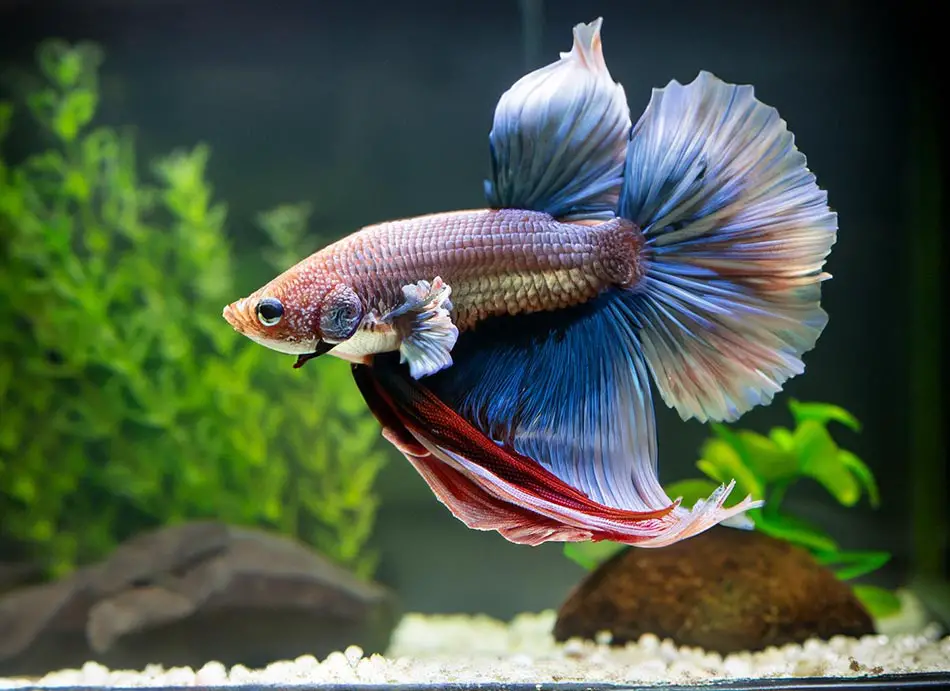
If there are no other signs of illness present, it’s always best to check water quality and parameters first, as poor water conditions are the most common reason for health issues or abnormal behaviors.
Once you have checked the water, you need to systematically rule out any changes that have occurred, such as a new diet, changes to the environment, or new tank mates.
How To Prevent A Betta Fish From Staying In One Place
While it’s ok for a healthy betta fish to stay in one place from time to time, you should try and prevent it from becoming a permanent behavior as it can lead to boredom and depression setting in.
There are several ways to prevent your betta fish from staying in one place, which keeps them active and it’s good for their overall health and digestion.
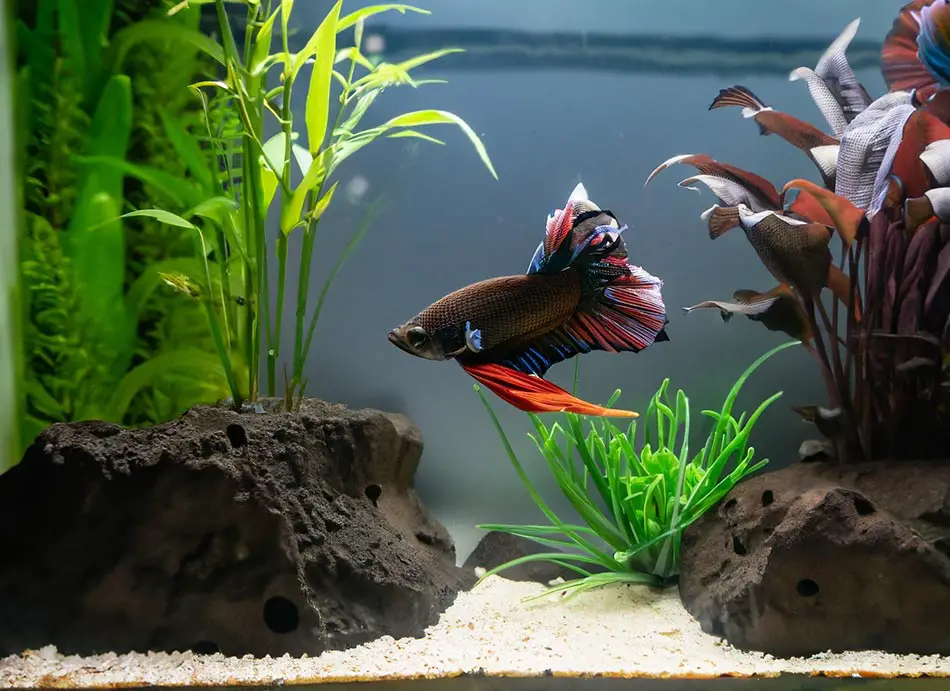
The best ways to keep your betta fish active are:
- Regular tank maintenance.
- Increase their tank size.
- Provide a healthy and varied diet.
- Add some toys to the tank.
There is a wide range of betta toys available, or you can make your own. The most popular toys are floating mirrors, colored floating balls, hoops, and floating bells.
Betta fish can play with toys for hours on end, and it helps to make them more friendly and active while providing them with ample exercise.
Wrap Up
If your betta fish is not moving, it can be perfectly normal behavior, but it can also indicate a problem that needs to be investigated.
A betta that is staying in one place but is otherwise healthy may just be chilled out and passing time (especially if it’s their usual behavior). Alternatively, a betta fish that is lying still on the bottom, barely breathing and turning white, may be close to death.
While these are extremes, anything unusual should be investigated, from your betta frequently sleeping to signs of constipation or swim bladder issues.
Sudden behavioral changes are an indicator that something is wrong and give you the best opportunity to make a quick diagnosis.
If your betta fish is generally inactive, simply providing a larger environment and adding some stimulation can give them a new lease on life.


